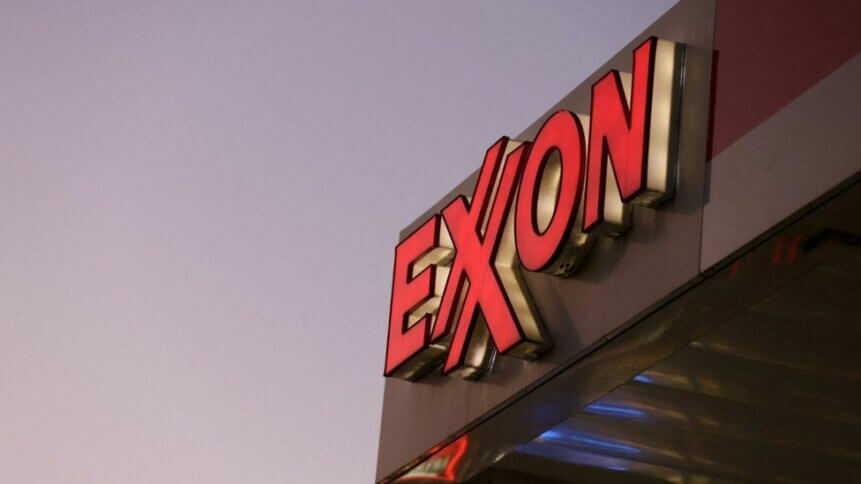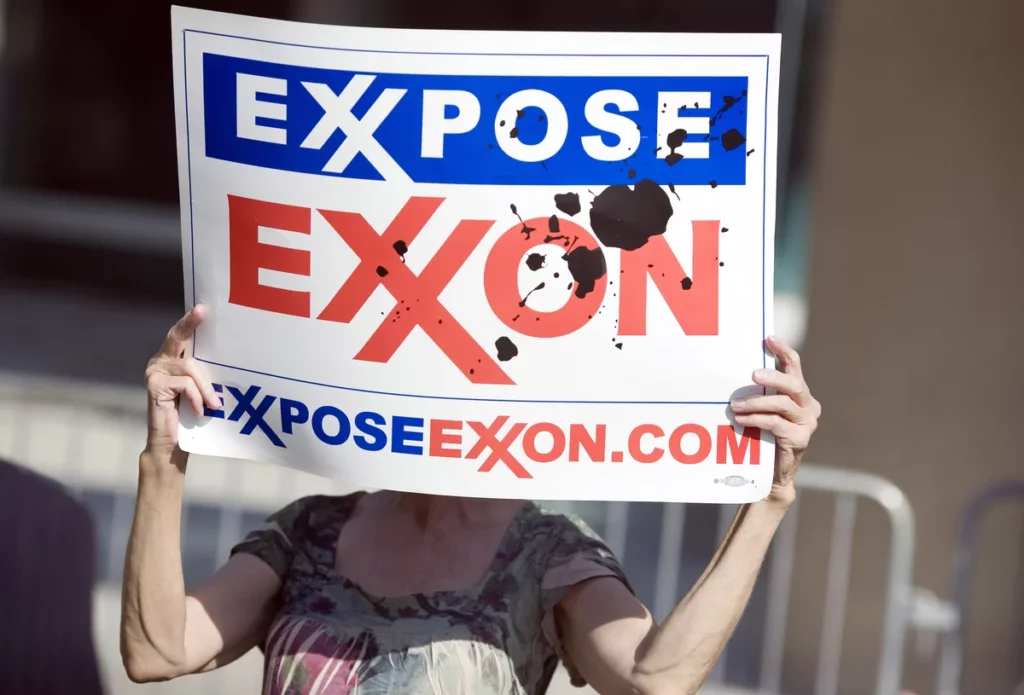Oil and gas company says suing climate activists isn’t political

- An ExxonMobil lawsuit against activist investors was filed in January.
- Activist investors not acting in the interests of shareholders?
- Everyone in the industry is watching closely – keen for a way to make climate activists shut up?
Facing dozens of lawsuits that claim it lied for decades about its role in climate change and the dangers of burning fossil fuels, ExxonMobil has gone on the offensive. Sure, it could reflect on its climate impact, but the company feels its time and resources are better spent on a lawsuit targeting investors who want the company to slash its pollution.
As the world burns, ExxonMobil might as well dive into the flames headfirst, go down swinging and all that.
To try to shape corporate policies in publicly-traded companies, investors can file shareholder proposals that are voted on at annual meetings. ExxonMobil says a pair of investor groups are abusing the system by filing similar proposals year after year in an effort to micromanage its business.
At a time when global temperatures are rising and corporate analysts say most companies aren’t on track to meet their emissions targets, there are growing tensions between companies and investors. Pesky activists calling for corporations to cut climate impact!
“Exxon is really upping the ante here in a big way by bringing this case,” says Josh Zinner, chief executive of an investor coalition called the Interfaith Center on Corporate Responsibility, whose members include a defendant in the ExxonMobil case. “Other companies could use this tactic not just to block resolutions,” Zinner says, “but to intimidate their shareholders from even bringing these [climate] issues to the table.”
There’s potential for other companies to unleash litigation against climate activists – who aren’t getting enough heat already, right?
 ExxonMobil said it’s suing Arjuna Capital and Follow This because the US Securities and Exchange Commission (SEC) isn’t enforcing rules that dictate when investors can resubmit shareholder proposals.
ExxonMobil said it’s suing Arjuna Capital and Follow This because the US Securities and Exchange Commission (SEC) isn’t enforcing rules that dictate when investors can resubmit shareholder proposals.
Apparently, the case “is not about climate change,” and court is “the right place to get clarity on SEC rules,” according to ExxonMobil.
The shareholder proposal from Arjuna and Follow This called for ExxonMobil to cut emissions faster from its own operations and from its supply chain. That includes pollution created when customers burn its oil and natural gas. This is known as Scope 3 emissions and accounts for 90% of ExxonMobil’s carbon footprint.
The proposal that Arjuna and Follow This put forward is similar to others that the groups submitted in recent years. ExxonMobil says historically the motions received little support from other shareholders.
All eyes are on the case. “If companies are decreasingly able to get the SEC to allow them to exclude proposals that are obviously politically motivated, then the next question is, well, can the courts succeed where the SEC has failed — or, more accurately, not even tried?” commented Charles Crain – vice president of the National Association of Manufacturers, which represents ExxonMobil and other industrial companies.
After they were sued in federal court in Texas in January, Arjuna and Follow This withdrew the proposal and promised not to submit it to the company again, but ExxonMobil refuses to drop the case.
Follow This founder Mark Van Baal said the ExxonMobil lawsuit is trying to stifle shareholders.
“Apparently, Exxon does not want shareholders to vote on whether the company should accelerate its efforts to reduce emissions,” van Baal said. “This is the concern of more and more investors who want [to] safeguard the long-term future of the company and the global economy in view of the climate crisis.”
The threat of complete climate disaster is putting pressure on companies to cut down their emissions and other contributions to global warming – poor them. Many, including ExxonMobil, say they’re trying to eliminate or offset their greenhouse gas emissions by 2050 but, according to independent researchers, few companies have shown credible plans to achieve their targets.
The number of publicly listed corporations aiming for net zero rose from 417 to 929 between 2020 and 2023, according to the Net Zero Stocktake report. A basic checklist was applied to corporate claims including setting interim targets and covering all the emissions a company is responsible for – including Scope 3 emissions.
Fewer than 5% of the companies examined passed the test.
So it’s really no wonder that they’re all watching the ExxonMobil lawsuit closely; is the best way to offset emissions suing the people holding you accountable?
Industry group the American Petroleum Institution says the lawsuits are meritless and politicized. ExxonMobil’s take is that since it’s acknowledged that climate change is real and, noted in its statement to NPR, is pursuing more than $20 billion of “low emission investments” between 2022 and 2027 then it shouldn’t have to answer to activist investors.

The oil and gas company doesn’t have a good track record.
The investment its making is on top of nearly $5 billion it spent buying a company specializing in carbon dioxide capture. The thing is, if it’s really so committed to the climate cause, why do shareholder proposals about its emissions annoy the company so much?
If you look at the numbers, its dedication suddenly seems… smaller.
The amount that ExxonMobil spends on its traditional energy business is staggering: last year it struck a deal to buy oil and gas company Pioneer Natural Resources, valued at almost $60 billion.
Activist investors use shareholder proposals to push corporations on climate. Experts say other investors, from whom Arjuna and Follow This struggle to get support, are hesitant to back new climate proposals when companies already have policies to disclose and cut emissions.
Investors worry proposals have become too prescriptive and might interfere with how companies are run.
It seems at least possible that changing how companies are run is the answer to cutting carbon emissions, but that it may reduce the profit investors see – a conundrum indeed within a capitalisic snowglobe, while everyone else burns.
ExxonMobil says it’s dedicated to cutting emissions from its operations but the idea that activist investors like Arjuna and Follow This can quickly push the company out of the oil and gas business with new climate policies is “simplistic and against the interests of the vast majority of ExxonMobil shareholders.”
ExxonMobil told NPR that while shareholders are entitled to submit proposals to the company, they don’t have “an unlimited right to put forth any proposal to do anything.
“Their intent is to advance their agenda rather than creating long-term value for shareholders,” ExxonMobil said of Arjuna and Follow This.
This appears to insist that having a planet to stand on is somehow not in the long-term interest of ExxonMobil shareholders. Which is how conspiracy theories get started.
Corporate America doesn’t like the shareholder proposals process and became increasingly frustrated by it after the SEC issued guidance in 2021 that made it harder to turn away some resolutions.
The National Association of Manufacturers has argued that forcing companies to publish shareholder proposals that deal with “contentious issues unrelated to [their] core business or the creation of shareholder value,” including climate change, violates their First Amendment right of free speech.
Crain says activists spend too much time pursuing a “political goal” and should instead try to help companies “understand and mitigate those climate related risks or opportunities for their operations.”
Critics of the ExxonMobil say its lawsuit is part of a broader effort to curtail shareholder activism, especially around social and environmental issues. “And the reason is because it’s one of the few effective avenues left to hold companies accountable,” says Zinner of the Interfaith Center on Corporate Responsibility.
So is the ExxonMobil lawsuit political or not?









